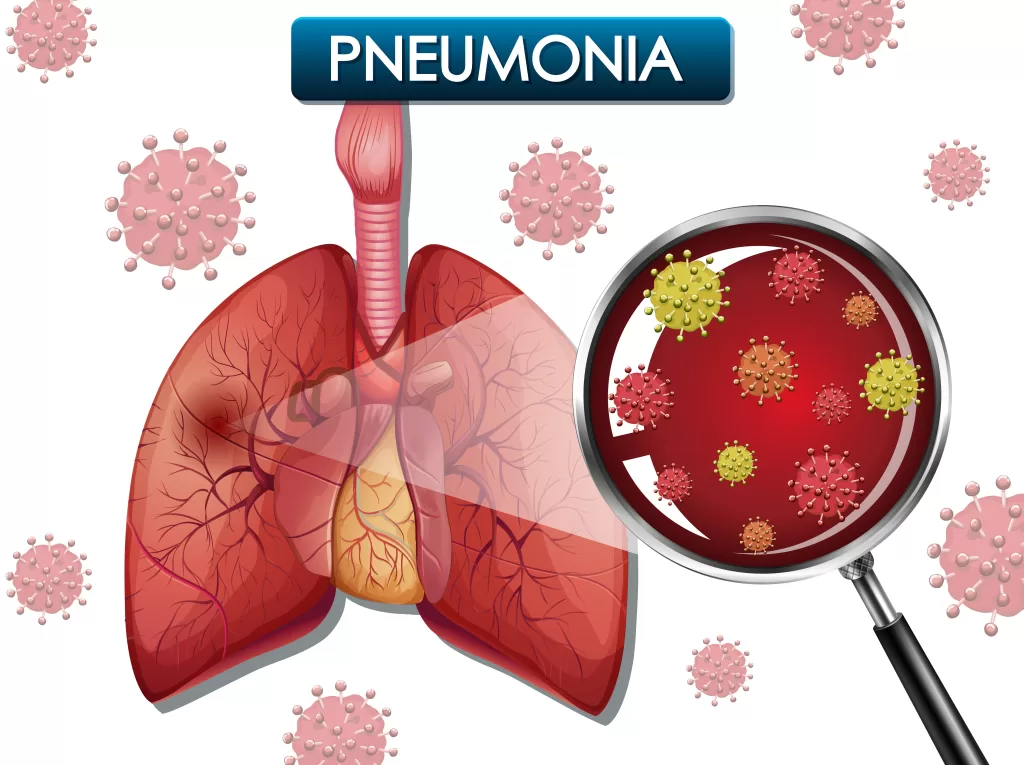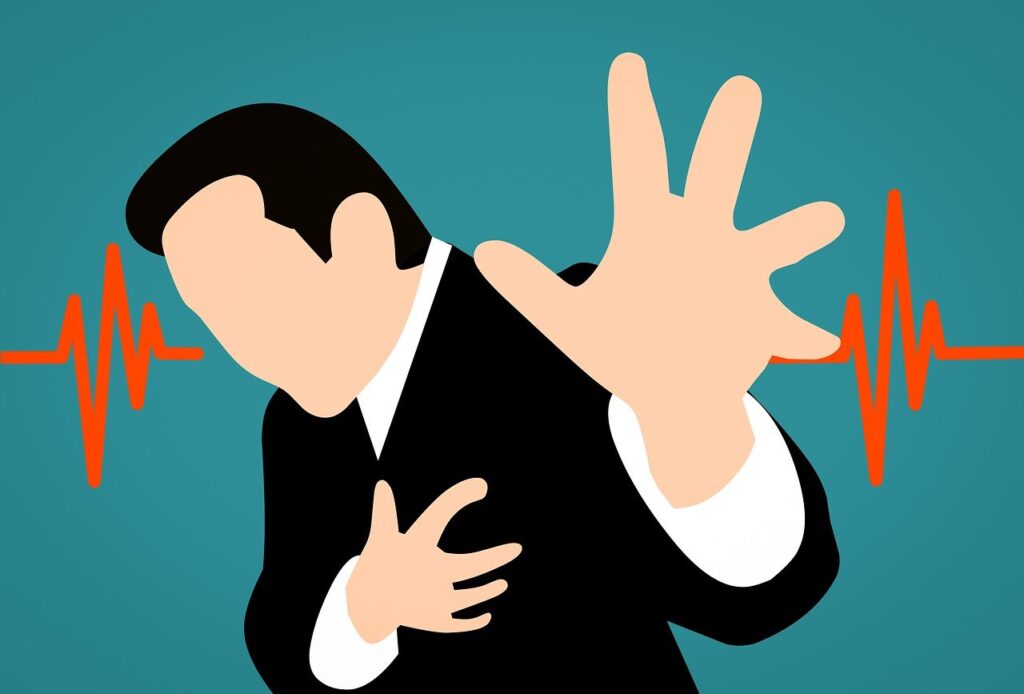Chest pain is a common and distressing symptom associated with pneumonia, an infection that affects the lungs. Chest pain in Pneumonia is characterized by inflammation and fluid buildup in the lung’s air sacs. This can lead to various other symptoms, including fever, cough, and, notably, great discomfort. In this article, I will dig deeper and explore the various causes of chest pain in pneumonia, the importance of seeking timely medical attention, and the treatment options available to alleviate pain and promote a full recovery.
Causes of Chest Pain in Pneumonia
Chest pain in pneumonia can have several underlying triggers, making it essential to identify the source accurately. Some of the primary contributors to chest pain in pneumonia include:
- Inflammation and Infection: An infection in the lung can cause inflammation of the pleura, a membrane that surrounds the lung and lines the chest cavity. This pleuritic chest pain is often sharp and worsens with deep breaths, coughing, or sneezing.
- Coughing: Frequent and forceful coughing to clear mucus and irritants from the airways can strain chest muscles, causing pain.
- Muscle Strain: The act of breathing can be painful due to inflammation, causing patients to breathe shallowly, which, in turn, may strain the intercostal muscles between the ribs, i.e., sternum pain, causing discomfort.
- Fever and Body Aches: Systemic symptoms of pneumonia, such as fever and generalized body aches, can contribute to overall discomfort, including chest pain.
What are the Danger Signs of Pneumonia?
Several danger signs indicate a severe or potentially life-threatening case of pneumonia. If you or someone you know experience any of these symptoms, seeking immediate medical attention is crucial:
- Difficulty Breathing: Shortness of breath or rapid, shallow breathing, especially when at rest or with minimal exertion, can indicate severe pneumonia or complications like respiratory failure.
- Chest Pain: Sharp or persistent chest pain, particularly when breathing deeply or coughing, could signal inflammation in the lung tissue or pleura (lining around the lungs).
- High Fever: A high fever, typically above 102°F (38.9°C), accompanied by chills, might indicate a more severe infection requiring immediate medical attention.
- Confusion or Altered Mental State: Mental confusion, disorientation, or changes in consciousness could be a sign of decreased oxygen levels or potential complications.
- Cyanosis: Bluish discoloration of the lips, nails, or skin due to inadequate oxygenation can indicate severe respiratory distress.
- Rapid Heart Rate: A significantly increased heart rate, especially when combined with other symptoms, might indicate severe illness.
- Persistent Vomiting or Diarrhea: Severe pneumonia can sometimes cause gastrointestinal symptoms, leading to persistent vomiting or diarrhea.
- Worsening Symptoms: If pneumonia symptoms worsen despite taking prescribed medications or if new symptoms develop, it’s essential to seek medical attention promptly.
- Inability to Keep Hydrated: Difficulty drinking fluids or signs of dehydration, such as decreased urine output, dry mouth, or extreme thirst, can be concerning, especially in severe cases of pneumonia.
- Persistent Fatigue or Weakness: Overwhelming fatigue or weakness that doesn’t improve with rest can indicate severe illness or complications.
- Sudden Deterioration: A rapid decline in overall health or sudden worsening of symptoms, such as extreme difficulty breathing, can signal a medical emergency.
- Pre-existing Health Conditions: Individuals with chronic conditions like heart disease, lung disease, diabetes, or weakened immune systems are at higher risk of developing severe pneumonia. Any new or worsening symptoms in these individuals should be addressed promptly.
- Failure to Respond to Treatment: If pneumonia symptoms do not improve or worsen after several days of treatment, it might indicate antibiotic resistance or complications requiring immediate medical assessment.
Importance of Timely Pneumonia Medical Attention
Seeking pneumonia medical attention early is very important because, in severe cases, untreated pneumonia can lead to complications such as pleural effusion, lung abscesses, or sepsis, which can be life-threatening. While many cases of pneumonia are mild and you can manage them at home, some types, particularly bacterial and severe cases, require you to seek immediate medical attention. The chest pain associated with pneumonia can vary in intensity, from mild discomfort to severe stabbing pain. Therefore, prompt evaluation and diagnosis by your healthcare professional are essential.
How is Pneumonia Treated in the Chest?
- Antibiotics: Bacterial pneumonia, the most common form of the disease, requires antibiotics for effective treatment. Chest pain associated with bacterial pneumonia often improves as the infection resolves.
- Pain Medications: Over-the-counter pain relievers, such as ibuprofen or acetaminophen, can help alleviate chest pain and reduce fever.
- Cough Suppressants: Coughing can exacerbate chest pain. Cough suppressants may be prescribed to minimize the frequency and severity of coughing, allowing the chest to heal.
- Inhalers or Bronchodilators: In some cases, bronchodilators may be recommended to help open airways and ease breathing. These medications can reduce the strain on the chest muscles and alleviate discomfort.
- Rest and Hydration: Rest is essential to allow the body to recover. Staying well-hydrated helps thin mucus and makes it easier to clear from the airways.
- Oxygen Therapy: In severe cases, or when oxygen levels are low, supplemental oxygen may be administered to ensure adequate oxygenation of the body, reducing chest discomfort associated with
breathing difficulties. - Hospitalization: In cases of severe pneumonia, hospitalization may be necessary. Hospital-based treatment can provide more intensive care and monitoring, including intravenous antibiotics and
respiratory support, if needed.
How Long Does Chest Pneumonia Last?
The duration of pneumonia, including chest pneumonia, can vary widely depending on several factors, including the type of pneumonia, the underlying cause, the individual’s overall health, and the promptness of medical intervention. In general, the timeline for recovery from pneumonia involves different phases:
- Acute Phase: The initial phase where symptoms are most severe. During this period, individuals may experience high fever, cough, chest pain, and difficulty breathing. The acute phase can last anywhere from a few days to a week or more.
- Treatment Phase: Once diagnosed, treatment usually involves antibiotics for bacterial pneumonia, antiviral medications for viral pneumonia, and supportive care. Improvement is often noticeable within a few days of starting appropriate treatment.
- Convalescent Phase: After the acute phase, individuals enter a recovery or convalescent phase where symptoms gradually improve. Fatigue and a lingering cough might persist, but overall well-being improves. This phase can last several weeks.
- Complete Recovery: Most individuals recover fully from pneumonia. However, the time it takes to return to normal activities and feel completely well varies. In some cases, it may take a few weeks, while for others, it might take several weeks to months, especially in cases of more severe pneumonia or in individuals with underlying health conditions.
Recovery and Follow-Up
Recovery from pneumonia and associated chest pain varies from person to person and depends on the severity of the infection. Even after the acute infection is treated, it may take weeks or months to recover fully. Follow-up appointments with a healthcare provider are essential to monitor progress, address any lingering symptoms, and ensure no complications.
Chest pain in pneumonia is a significant concern for those affected by this lung infection. It is essential to seek prompt medical attention to determine the cause and severity of the chest pain, as well as the underlying pneumonia. Timely diagnosis and appropriate treatment are crucial in managing pneumonia and alleviating chest pain. With the proper medical care and adherence to treatment protocols, most individuals can recover from pneumonia, regain their lung function, and return to a healthy, active life.
Learn more about health topics by visiting www.medicalantidote.com.



